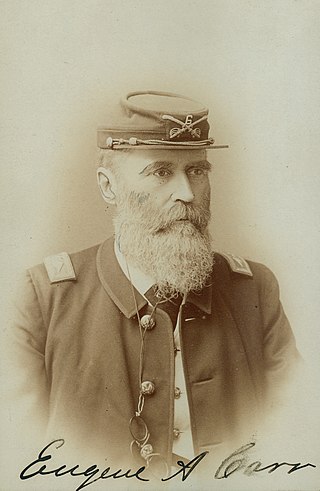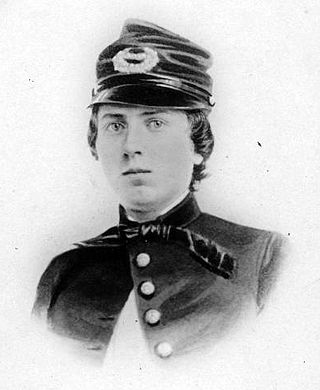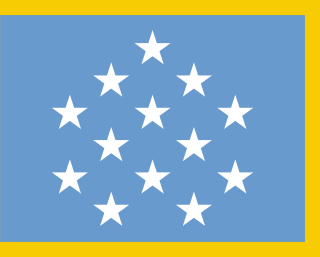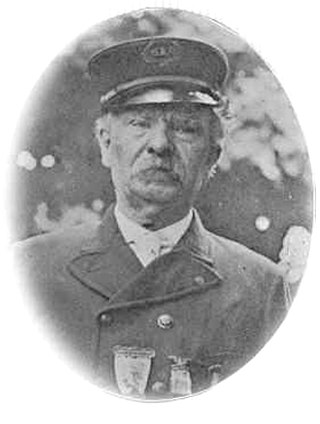
William Harvey Carney was an American soldier during the American Civil War. Born enslaved, he was awarded the Medal of Honor in 1900 for his gallantry in saving the regimental colors during the Battle of Fort Wagner in 1863. The action for which he received the Medal of Honor preceded that of any other African American Medal of Honor recipient; however, his medal was actually one of the last to be awarded for Civil War service. Some African Americans received the Medal of Honor as early as April 1865.

Uriah Galusha Pennypacker was a Union general during the American Civil War. He may be the youngest person to hold the rank of brigadier general in the US Army and remains the only general too young to vote for the president who appointed him. He was awarded the Medal of Honor for his leadership at the Second Battle of Fort Fisher during the Civil War.

Eugene Asa Niel Carr was a soldier in the United States Army and a general in the Union Army during the American Civil War. He was awarded the Medal of Honor for his actions at the Battle of Pea Ridge.

John Freeman Mackie was a United States Marine Corps sergeant during the American Civil War. He was awarded the nation's highest military decoration for valor—the Medal of Honor, for his actions aboard the USS Galena during the battle with Confederate Marines and artillery batteries at Fort Darling near Richmond, Virginia, on May 15, 1862. He is one of the first two Marines to be awarded the Medal of Honor, and is considered to be the first Marine to receive the Medal of Honor in the history of the Marine Corps.

Alonzo Hereford Cushing was an artillery officer in the Union Army during the American Civil War. He was killed in action during the Battle of Gettysburg while defending the Union position on Cemetery Ridge against Pickett's Charge. In 2013, 150 years after Cushing's death, he was nominated for the Medal of Honor. The nomination was approved by the United States Congress, and was sent for review by the Defense Department and the President.

Richard Stout was a Union Navy sailor during the American Civil War and a recipient of the United States military's highest decoration, the Medal of Honor for his actions in an engagement with Confederate naval and land forces on the Stono River in South Carolina.

The Medal of Honor (MOH) is the United States Armed Forces' highest military decoration and is awarded to recognize American soldiers, sailors, marines, airmen, guardians, and coast guardsmen who have distinguished themselves by acts of valor. The medal is normally awarded by the president of the United States and is presented "in the name of the United States Congress." It is often colloquially referred to as the Congressional Medal of Honor.

Eugene W. Ferris was a United States soldier who fought with the 30th Regiment Massachusetts Volunteer Infantry during the American Civil War. He received his nation's highest award for bravery during combat, the U.S. Medal of Honor, for resisting an attack by enemy cavalrymen near Berryville, Virginia on April 1, 1865. That award was conferred 32 years later on October 16, 1897.
Private Thomas Burke was an American soldier who fought in the American Civil War. Burke received the United States' highest award for bravery during combat, the Medal of Honor, for his action at Hanover, Pennsylvania on June 30, 1863. He was honored with the award on February 11, 1878.

Private Nicholas Fox was an American soldier who fought in the American Civil War. Fox received the country's highest award for bravery during combat, the Medal of Honor, for his action during the Siege of Port Hudson in Louisiana on 14 June 1863. He was honored with the award on 1 April 1898.

Julius Dexter Rhodes was a sergeant major in the United States Army who was awarded the Medal of Honor for gallantry during the American Civil War. After having his horse shot from under him at the Battle of Throughfare Gap, he helped the 105th New York Volunteers advance on the enemy line. He was later wounded while fighting in the Second Battle of Bull Run. He was awarded the Medal of Honor on 9 March 1887.

Albert D. Wright was an American soldier who fought with the Union Army in the American Civil War and was awarded the Medal of Honor.

Clifford Thomson was an American soldier who fought as a First Lieutenant with the 1st New York Cavalry in the American Civil War. He was awarded the medal for actions at the Battle of Chancellorsville.

William G. Tracy was an American soldier awarded the Medal of Honor for actions during the American Civil War. The medal was awarded for actions as a Second Lieutenant at the Battle of Chancellorsville with the 122nd New York Infantry on 2 May, 1863. He was born in Syracuse, New York and died there in 1924.
Alason P. Webber was an American musician and soldier who served in the Union Army during the American Civil War. He was awarded the Medal of Honor on 22 June, 1896 for actions as a musician with the 86th Illinois Infantry Regiment at Kenesaw Mountain, Georgia on 27 June, 1864. He was born in Greene County, New York and died in Henry, Illinois where he is buried at the Saratoga Methodist Church Cemetery.

Henry Walker Rowe was a private in the United States Army who was awarded the Presidential Medal of Honor for gallantry during the American Civil War. Rowe was awarded the medal on December 1, 1864 for actions performed at the Second Battle of Petersburg in Virginia on June 17, 1864.
Edwin F. Savacool was a captain in the United States Army who was awarded the Presidential Medal of Honor for gallantry during the American Civil War. He was awarded the medal on April 24, 1865, for actions performed at the Battle of Sailor's Creek in Virginia on April 6, 1865.














